|
Itching in the scrotum is usually not serious, but a common and embarrassing problem in men. The scrotum is a muscular sac that contains and protects the testicles, blood vessels, and spermatic cord. The folded skin surface is sensitive, thin, and has many glands, making it an ideal location for irritations and infections.
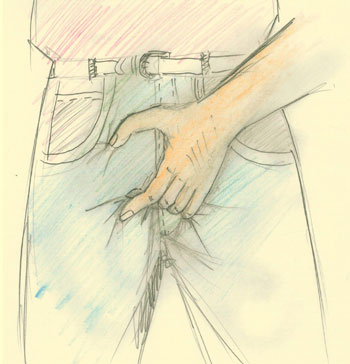
For whatever reason of an itchy scrotum, good personal hygiene is critical.
|
Causes of itchy Scrotum
Itchy scrotum can be resulted from a variety of factors, and many of them are similar to itching in other parts of the body. A complete relief of the symptom relies treatment based on underlying conditions. Common causes for itchy scrotum include:
 Fungal infections: the skin folks behind the scrotum provide a warm and moist place for fungal growth. Jock itch or Tinea cruris is the most common problem in the region. It typically appears as red rashes with clear edges, and with an itching or burning feeling and occasionally foul smell. The scaly rashes occur on both sides, may spread to the inner thighs or buttocks, but usually not toward the scrotum or penis. Most jock itch can be easily treated with OTC products, and possibly resolve on its own. Fungal infections: the skin folks behind the scrotum provide a warm and moist place for fungal growth. Jock itch or Tinea cruris is the most common problem in the region. It typically appears as red rashes with clear edges, and with an itching or burning feeling and occasionally foul smell. The scaly rashes occur on both sides, may spread to the inner thighs or buttocks, but usually not toward the scrotum or penis. Most jock itch can be easily treated with OTC products, and possibly resolve on its own.
 Parasites: pubic lice feed on the human blood in the groin area which causes intense itching. Scabies also called itch mite live in the skin folds of the groin area, and they bite to cause irritations. Parasites: pubic lice feed on the human blood in the groin area which causes intense itching. Scabies also called itch mite live in the skin folds of the groin area, and they bite to cause irritations.
 Genital skin problems: the groin can develop eczema, seborrheic dermatitis or psoriasis just like other body regions. Heat rash in the groin usually affects individuals who sweat a lot and during summer season. Elderly people are usually associated with dry skin in the area. Genital skin problems: the groin can develop eczema, seborrheic dermatitis or psoriasis just like other body regions. Heat rash in the groin usually affects individuals who sweat a lot and during summer season. Elderly people are usually associated with dry skin in the area.
 Allergies and irritations: items like soap, body cleanser, laundry detergent, disinfectant, condom or rough clothing, may lead to irritation of the genital skin. Allergies and irritations: items like soap, body cleanser, laundry detergent, disinfectant, condom or rough clothing, may lead to irritation of the genital skin.
 Yeast infection: an overgrowth of fungal microorganism "Candida albicans" that found in the skin, mouth, and gut normally. It is known as thrush when occurs as mouth sores, diaper rash when affected the buttocks of babies, candidiasis when infected the blood, and yeast infection when affected the groin area. Yeast infection: an overgrowth of fungal microorganism "Candida albicans" that found in the skin, mouth, and gut normally. It is known as thrush when occurs as mouth sores, diaper rash when affected the buttocks of babies, candidiasis when infected the blood, and yeast infection when affected the groin area.
 Sexually transmitted disease (STD): pain or itching around the genital area is often the initial symptom of genital herpes, before small bumps or blisters developing. Genital warts usually don't have any symptom, but the flesh-colored or gray swellings may cause itching or bleeding sometimes. Sexually transmitted disease (STD): pain or itching around the genital area is often the initial symptom of genital herpes, before small bumps or blisters developing. Genital warts usually don't have any symptom, but the flesh-colored or gray swellings may cause itching or bleeding sometimes.
 Systemic diseases and emotional upset: systemic diseases or chronic illnesses such as diabetes, chickenpox, HIV/AIDS, hepatitis, and cancer can increase the risk of developing itchy scrotum. Stress and emotional upset usually make itching worse. Systemic diseases and emotional upset: systemic diseases or chronic illnesses such as diabetes, chickenpox, HIV/AIDS, hepatitis, and cancer can increase the risk of developing itchy scrotum. Stress and emotional upset usually make itching worse.
Self-care to ease itchy scrotum
No matter what causes an itchy scrotum, good personal hygiene is critical for symptom relief and prevention. Individuals are suggested to follow as below:
 Don't scratch: scratching causes further inflammation and cracks to the affected area, which not only aggravate the itching, but also increase the risk of developing secondary infection. Scratching also facilitates some skin problems to spread to other regions. Don't scratch: scratching causes further inflammation and cracks to the affected area, which not only aggravate the itching, but also increase the risk of developing secondary infection. Scratching also facilitates some skin problems to spread to other regions.
 Avoid irritations: any offending agents such as creams, fragranced or dyed soaps, tight undergarment, or synthetic fabrics may cause unnecessary irritations. Avoid irritations: any offending agents such as creams, fragranced or dyed soaps, tight undergarment, or synthetic fabrics may cause unnecessary irritations.
 Keep clean and dry: take a shower every day, thoroughly wash your genitals, inner thighs and buttocks with a mild soap and warm water, and then pat dry with a clean towel, so as to prevent bacterial and fungus growing. Remember that harsh soaps, hot bath or shower can make the situation worse. Make sure to dry the region completely before dressed. Keep clean and dry: take a shower every day, thoroughly wash your genitals, inner thighs and buttocks with a mild soap and warm water, and then pat dry with a clean towel, so as to prevent bacterial and fungus growing. Remember that harsh soaps, hot bath or shower can make the situation worse. Make sure to dry the region completely before dressed.
 Change underwear daily: change underwear frequently especially after sweating or exercise; and wash the clothes, underwear or towels after each use. Change underwear daily: change underwear frequently especially after sweating or exercise; and wash the clothes, underwear or towels after each use.
 Avoid being barefoot in public places: especially in gyms, locker rooms and public pools, and don't share towels or other personal belongs with people. Avoid being barefoot in public places: especially in gyms, locker rooms and public pools, and don't share towels or other personal belongs with people.
 Wear loose cotton underwear and clothing: tight-fitting underwear or pants increase groin moisture and friction which will lead to itchy scrotum. If necessary, use an antifungal powder to keep the groin area dry. Wear loose cotton underwear and clothing: tight-fitting underwear or pants increase groin moisture and friction which will lead to itchy scrotum. If necessary, use an antifungal powder to keep the groin area dry.
 Manage stress level: lifestyle modifications and relaxing techniques are very important, and drink adequate water to prevent the body becoming dehydrated. Manage stress level: lifestyle modifications and relaxing techniques are very important, and drink adequate water to prevent the body becoming dehydrated.
 Antifungal cream: individuals with jock itch may need to apply anti-fungal cream for a short duration. If the scrotum rash doesn't go away within two weeks, you should see a dermatologist. Treat athlete foot to prevent it spreading to the groin again. Antifungal cream: individuals with jock itch may need to apply anti-fungal cream for a short duration. If the scrotum rash doesn't go away within two weeks, you should see a dermatologist. Treat athlete foot to prevent it spreading to the groin again.
For the best result, individuals should consult a doctor for an accurate diagnosis, and treat the itchy scrotal rash appropriately. Those come and go cases may become resistant to regular treatment, and thus a more comprehensive approach is required. Traditional Chinese medicine (TCM) has a rich experience in skin problems; the remedies can provide a promising result for some stubborn cases with long-lasting relief and fewer side effects.
Chinese herbal remedies to stop itchy scrotum
From a TCM holistic view, condition of the external male genitalia is associated with internal organs. The external male genitalia are mainly controlled by liver meridian, and the Conception Vessel and Governor Vessel also have a strong influence on them. Small intestine and bladder dominate its urination process, and kidney dominates its reproductive function. Itchiness and rash in the external genitalia are often due to both internal and external causes. Internally, the body develops a disharmony such as damp-heat, toxic heat or, blood deficiency that makes the area susceptible to external irritations. When external pathogens take advantage to attack the area, an itchy condition will be triggered. TCM physicians will focus on both resuming internal harmony and clearing the local irritations. The treatment for itchy scrotum is usually combined oral decoctions and topical remedies, so as to enhance an overall recovery.
During a consultation, physician will check in details about the local changes and the whole body signs. Below are the common disharmony patterns of itchy scrotum and the anti-itch herbal remedies.
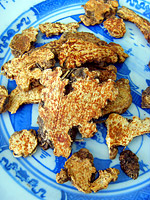 |
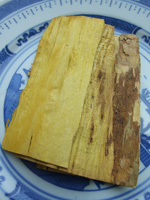 |
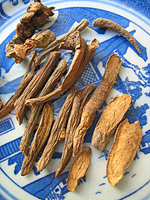 |
| Atractylodes rhizome |
Amur corktree bark |
Garden burnet root |
Damp-heat accumulated in lower burner
The scrotum is red and itchy, and has rashes and small blisters on the surface. When the skin is broken by scratching, it oozes and has burning and pain feelings. The tongue is red and covered by yellow and greasy coating, and the pulse is thready and rapid. The remedy should aim to purge damp-heat in the liver and gall-bladder.
Sample of prescription: modified Gentian Liver-Purging Decoction plus sopora root, paniculated swallow-wort root
Yin deficiency and blood dryness
Long term itchy scrotum with a thick and rough skin surface, bleeding or scratching marks may be seen on it. There are also restless, irritability, thirst, insomnia, a red tongue, and thready and rapid pulse. The remedy should aim to enrich blood, and disperse wind.
Sample of prescription: modified Four-substance Decoction plus cicada slough, ledebouriella root
Coldness and dampness in lower burner
The scrotum is itching and moist. Individuals may accompany with weakness and soreness in the thighs and knees, a heavy sensation in the lower abdomen, urinary difficulty, and heaviness and swelling of the lower legs. The tongue is covered by white and glossy coating, and the pulse is deep, slow and forceless. The remedy should aim to warm meridians, dispel coldness and dampness, and stop itching.
Sample of prescription: modified Five-accumulation Powder
External wind and heat attacking
The groin area is dry and itchy, which feel alleviated by moistening. In serious cases, it appears red small bumps, with numbing and tickling sensations. When ruptured by scratching, the skin surface oozes yellow discharges, and has burning pain. The tongue has thin yellow coating, and the pulse is taut and rapid. The remedy should aim to disperse wind, clear heat and stop itching.
Sample of prescription: modified Wind Dispersing Powder plus honeysuckle flower, weeping forsythia capsule, red peony root
External herbal remedies for itchy scrotum
Topical remedies are commonly applied for itchy scrotum. The remedies target on the local problems directly, which can achieve faster and long-lasting results. TCM physicians use a wide range of herbs for the external remedies. The herbs can work directly to reduce skin inflammation, arrest discharges, stop itching, anti-septic, anti-fungal, and promote dead skin peeling and new skin growing. They can be selected according individual conditions and are unlikely to cause side effects.
 |
Sopora root (25g), schizonepeta herb (25g), cicada slough (25g), atractylodes rhizome (25g), common cnidium fruit (25g). |
 |
Amur corktree bark (30g) and garden burnet root (30g); the decocted solution can be used for compress in oozing skin lesion. |
 |
Sopora root (10g) and pricklyash peel (10g); for the early eruption of scrotal rash with redness and oozing, soak in the decocted solution. |
 |
Cnidium fruit decoction is suitable to itchy condition with thickened, rough and darkened skin lesion. |
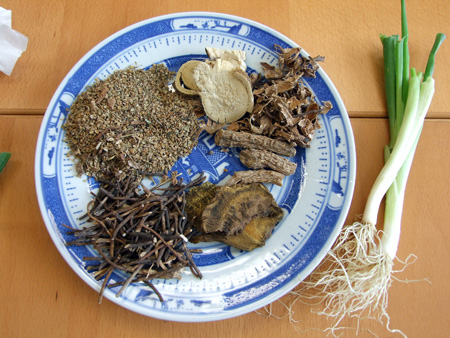
Cnidium fruit decoction
|
Application: soak the herbs in water for 20 minutes, cook for 20 minutes to make 2000ml of solution, pour in a basin. Steam the groin region over the hot solution, when it cools, soak in for 20 minutes more. Do this in the morning and at night, steam and soak for 30 minutes each time. After finished, pat gently to dry and then apply on a thin layer of protectant. Apply for 3 to 5 days.
 |
Talc (30g), processed alum (20g) and dictamnus root bark (30g); process in fine powder mixture and store in a container. Dust on the groin area twice a day. This can reduce inflammation, arrest sweating and stop itching. |
 |
Indigo cream: natural indigo (6g), calcined gypsum (12g), talc (6g) and amur corktree bark (6g), gallnet of Chinese sumac (6g) and Vaseline (100g). Grind the ingredients into fine powder and mix with Vaseline to make into herbal cream, store properly. This can relieve itchy scrotum that is dry and cracked. |
TCM dietary advice for itchy scrotum
Since internal disharmony plays an important role for the development of itchy conditions, TCM physicians always suggest their patients to follow some dietary rules so as to ensure a full recovery. Individuals with itchy scrotum should keep a plain and easily digested diet, eat more food such as spinach, celery, cucumber, watermelon, rice bean, bean sprouts, chrysanthemum, lettuce, corn, wax gourd, bok choy, crucian carp and carp, which help prevent damp-heat accumulating inside the body. General food taboos include heavy spicy, deep fried, greasy, seafood (especially non-scaled types), fishy or strong smell meats, and also coffee, tea and alcohol. Frozen food and uncooked pungent food such as onion, garlic, chives, leek, and coriander tend to interfere with the treatment efficacy, and thus should be avoided during attacks. Some simple healthy recipes:
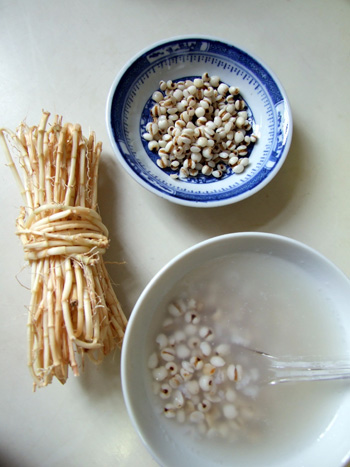
Coix seed and couch grass rhizome soup
|
 |
Coix seed (100g), and fresh couch grass rhizome (10g); first decoct the couch grass rhizome for 30 minutes to make a 1000ml of solution, then use the solution and coix seed to cook as porridge. Consuming regularly is beneficial to cool blood, disperse dampness and stop itching. |
 |
Fresh couch grass rhizome (30g), oriental water-plantain rhizome (15g), mung bean (50g) and rock sugar (20g); first decoct the two rhizomes for 30 minutes to make a 1000ml of solution, then use the solution, mung bean and sugar to cook as porridge. Consuming regularly is beneficial to detoxify, disperse dampness, reduce skin inflammation and stop itching. |
 |
Fresh Chinese yam (200g), poria (100g), red dates (100g), and honey (30g); steam the Chinese yam and then squashed, mince the red dates and remove the stones, grind the poria into powder, mix them together and steam as cake. When serving, pour the honey on the cake. This cake helps invigorate spleen, disperse dampness, nourish yin and moist dryness, which are beneficial to itchy conditions accompanied with thicken, dry and rough skin lesion. |
|